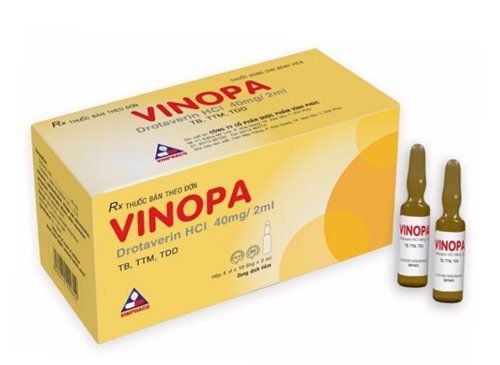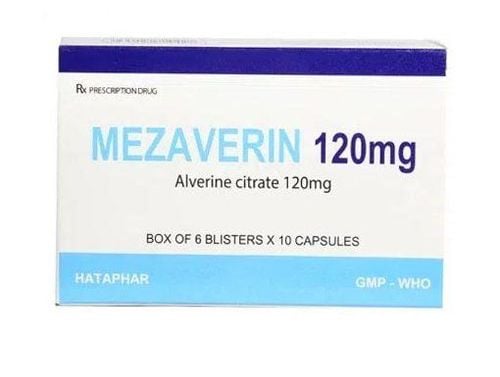This is an automatically translated article.
Opispas is an injectable medication used in cases of smooth muscle spasms such as renal colic or biliary colic. Opispas is available as an injection and is usually used for acute pain. Find out more information about the drug through the article below.1. What is Opispas?
Opispas medicine has the main ingredient Papaverine 40mg/2ml (in the form of Hydrochloride salt) which is prepared for injection.Papaverin is an alkaloid extracted from the resin of the poppy plant or can be synthesized, belonging to the benzylisoquinolin group. The main therapeutic effect of Papaverin is applied to antispasmodic smooth muscle. The antispasmodic effect of papaverin is mainly in the blood vessels including coronary arteries, cerebral arteries, lungs and peripheral blood vessels. Papaverin also has a relaxing effect on bronchial, gastrointestinal, ureteral, and biliary smooth muscle.
The antispasmodic effects of papaverin are direct and the drug rarely produces CNS effects, although high doses may cause depression in some patients. In the past, papaverin has also been used against cerebral ischemia, peripheral ischemia due to arterial spasm, myocardial ischemia, bronchospasm, asthma, and angina pectoris. However, because the effects and effects are not obvious, today these indications are abandoned and replaced by more effective drugs.
2. Indications and contraindications of the drug Opispas
Indications: Opispas drugs are indicated in the following cases: indications: Opispas drugs are indicated in the following cases:
Abdominal pain caused by increased intestinal motility, stomach. Renal colic and biliary colic. Contraindications of Opispas: Opispas is contraindicated in the following cases:
Patients with hypersensitivity to the active ingredient papaverin or any ingredient of the drug. When there is complete atrioventricular block. Use with caution in patients with impaired conduction, because using this drug can cause transient ventricular extrasystoles or paroxysmal tachycardia. Parkinson disease .
3. Dosage and administration of Opispas
3.1. How to use
Opispas is available as an injection. May be administered by intramuscular or slow intravenous injection.Intravenous injection as needed for immediate effect, but should be administered slowly over 1-2 minutes to avoid serious ADRs.
3.2. Dosage
Adults: The usual dose of papaverin hydrochloride injection for adults is 30mg; However, it can be used at a dose of 30 - 120 mg, repeated every 3 - 4 hours, if needed. Children: Children can be used at a dose of 4-6 mg/kg/24 hours, divided into 4 small doses, administered intramuscularly or intravenously Elderly: Usually used at a dose of 30-65 mg (rarely in the elderly). up to a dose of 120 mg), may be repeated every 3 hours.3.3. Overdose
Used under the doctor's prescription should limit overdose. However, if an overdose occurs, the symptoms of overdose are usually vasomotor instability, nausea, vomiting, muscle weakness, CNS depression, nystagmus, diplopia, diaphoresis, flushing, and dizziness. face, rapid heart rate. In cases of severe overdose, papaverin causes strong inhibition of cellular respiration and presents as a weak calcium channel blocker. Acute management should be with respiratory protection and supportive, symptomatic treatment.4. Opispas . side effects
Some of the side effects you may experience when injecting Opispas include: Some of the side effects you may experience when injecting Opispas include:
Common: Body discomfort, nausea, discomfort in abdominal pain, loss of appetite, constipation or diarrhea, skin rash, headache, flushing, sweating, sedation, hepatitis, hypotension or possibly increased blood pressure, thrombosis at the injection site circuit. Uncommon: Facial flushing, tachycardia, mild hypertension, arrhythmias commonly seen with rapid intravenous administration; dizziness, somnolence, lethargy, headache; chronic hepatitis; Apnea (if rapid intravenous injection). Rare: Hypersensitivity reactions. If you have any unusual symptoms while taking Opispas, you should immediately notify your doctor or nurse for treatment.
5. Notes when using Opispas
Use papaverin hydrochloride with extreme caution in patients with glaucoma, glaucoma. Papaverine hydrochloride injection should only be used under the supervision of an experienced physician. Intravenous injection must be slow and cautious because if the patient is injected rapidly, it can cause arrhythmia and respiratory arrest leading to death.Discontinue papaverin when liver symptoms become apparent such as gastrointestinal symptoms, jaundice, or eosinophilia, or when liver function test results change. .
The drug should not be given to neonates due to the increased risk of cerebral vasodilatation of the drug and possible intracranial bleeding.
It is not recommended to take papaverin for a long time as this can lead to dependence on the drug.
Precautions for using Opispas in pregnancy: It is not known whether papaverin can cause fetal harm when administered to pregnant women, or may affect fertility. Do not use papaverin during pregnancy unless it is absolutely necessary.
Precautions for use of Opispas in lactating women: It is not known whether papaverin is excreted in human milk. Because many drugs are excreted in human milk, caution should be exercised and the benefits to the mother and the risk to the nursing infant should be weighed when papaverin is administered to a nursing mother.
Drug interactions:
Drugs that depress the central nervous system slightly increase the effect of papaverin. Morphine when used together has a synergistic effect with papaverin. When used concurrently, papaverin may interfere with the therapeutic effects of levodopa in people with Parkinson's disease; Because papaverin can block dopamine receptors. Avoid using papaverin in patients with Parkinson's disease, especially when this patient is being treated with levodopa. Do not mix papaverin hydrochloride injection with Ringer lactate injection solution as this may cause precipitation. Opispas is an injection and is used in medical settings to treat acute smooth muscle spasms. Due to the risk of many side effects, the drug should only be used when absolutely necessary under the supervision of an experienced physician.
Please dial HOTLINE for more information or register for an appointment HERE. Download MyVinmec app to make appointments faster and to manage your bookings easily.













